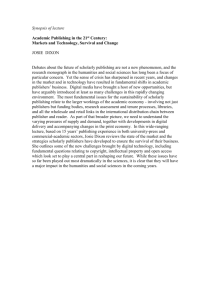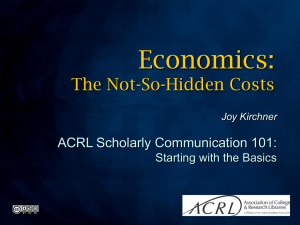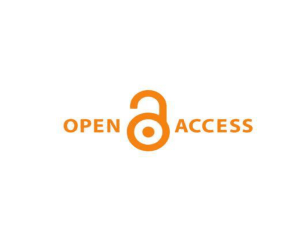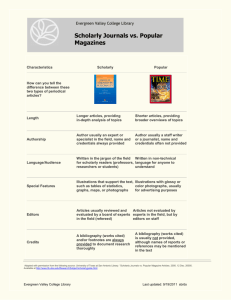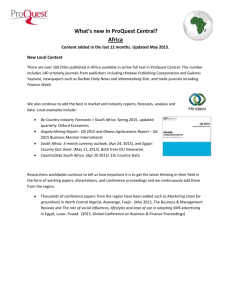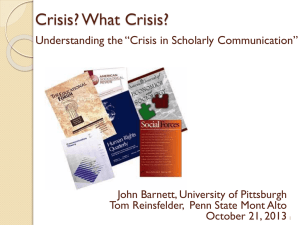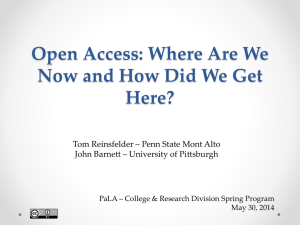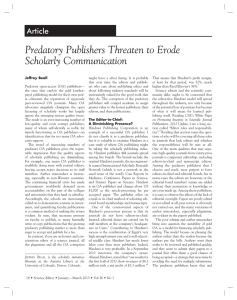Presenter Host Institution Date
advertisement
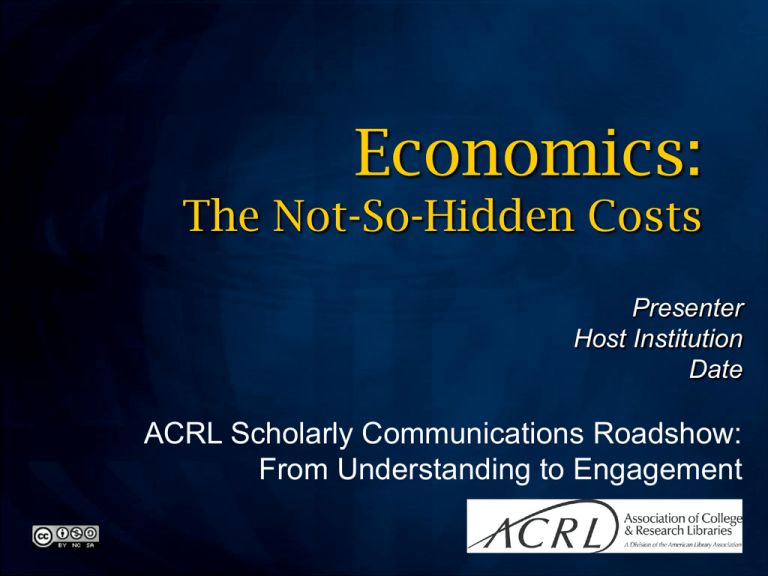
Economics: The Not-So-Hidden Costs Presenter Host Institution Date ACRL Scholarly Communications Roadshow: From Understanding to Engagement Learning Objectives • Understand some of the basic economic principles that characterize the traditional scholarly publishing system • Recognize the connection between poor copyright management on the part of authors and the monopolistic pricing practices of the largest scholarly journal publishers • Consider and reflect on alternative funding sources for scholarly publishing peer-reviewed journals peer-reviewed articles per year scholarly publishers (est.) Journal publisher size guide Petite (5 or fewer) Small (6-10) Medium (11-25) Large (26-50) X-Large (51-100) XX-Large (100+) 54% 11% 16% 8% 4% 7% Scholarly publishing practice: academic journal publishers’ policies and practices in online publishing, 3rd survey, ALPSP, 2008 university presses societies & other nonprofits commercial publishers Data from Simba Information 2010 publishing industry reports STM sector revenue in 2009 Typical economy Steel Cars Auto manufacturers Steelmakers $ Consumers $ Gift economy Article Author Publisher $ P&T Grants Reputation Prestige Journal Library $ wholesale transfer of rights © creates scarcity/monopoly Publisher drives prices up (inelastic market) Libraries challenge pricing power Subsidizing journal start-ups Canceling journals Educating faculty authors Forming consortia Fighting mergers Publishers try to sustain revenue flow Tying print to online Bundling journals Requiring multi-yr contracts Buying other publishers Raising prices Cost to produce one journal article Average journal article Average journal article My Facuty, PhD My Facuty, PhD XYZ Commercial Publisher ABC Not-forProfit Publisher Amsterdam, London, New York Roger Clarke, The cost profiles of alternative approaches to journal publishing, First Monday, 3 December 2007 Economics of quality? 9% $ 91% 62% citations dollars 38% citations External Economic Pressures on Journals Market U.S. Library Spending, R&D Spending, and Journals 1995-2007 From Outsell’s Open Access Primer (Public Version), December 2009 What about monographs? “in the 1970s academic publishers would print between 2000 and 3000 hardback [copies] of a scholarly monograph . . . [In 2005] many academic publishers say that sales of hardback-only monographs are often as low as 400-500 copies worldwide.” Thompson, J. (2005), Books in the Digital Age, Polity, Cambridge. Elsevier stock just downgraded to “underperform” From Bernstein Research (March10, 2011) “Reed Elsevier: The Inevitable Crunch Point—Downgrading to Underperform Because of Growing Concerns on Elsevier” Scholarly communications reform includes efforts to establish balanced, sustainable economic models Long-term solution may include shifting of library funds from collecting to producing or subsidizing scholarly content Questions? Comments? This work was created by Lee Van Orsdel for the ACRL National Conference, Scholarly Communications 101 Workshop and last updated by Molly Kleinman on April 24, 2011. It is licensed under the Creative Commons AttributionNoncommercial-Share Alike 3.0 United States License. http://creativecommons.org/licenses/by-nc-sa/3.0/
